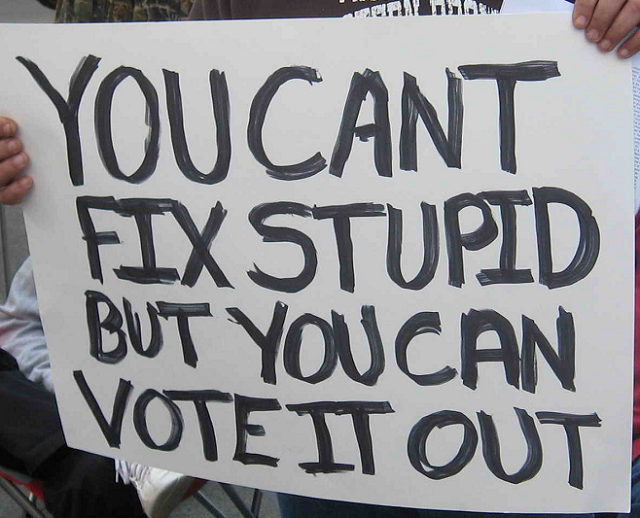
The 2014 Quebec election campaign is “useless” and full of “smear” campaigning, according to Radio-Canada listeners.
C’est pas trop tôt!, Radio-Canada’s morning radio show hosted by Marie-France Bazzo, asked its listeners to describe the Quebec election campaign in one word.
They received over 500 responses on Facebook and Twitter and we’ve translated and ordered them according to the most popular terms.
The results are in — and they aren’t good:
- Useless
- Smear
- Pathetic
- Empty
- Fear
- Mud
- Manipulation
- Amnesia
- Demagogy
- Sterile
- Dirty
- Deceiving
- Disinformation
OpEd from The Gazette: I want a Quebec where ‘nous’ again means all of us
The election campaign has only lasted a month, but it feels as long as our eight-month winter — and more exhausting. We all need time in a Post-Traumatic-Election-Stress recovery ward — with no politicians allowed. Fortunately, I see some sunshine breaking through the cloud of polls that wasn’t visible a few weeks ago.
I began this election like most anglos dreading the PQ would win a majority by exploiting the black magic charter debate that’s been tearing Quebecers apart. Happily, things are now moving the other way with Quebecers proving largely indifferent to the charter this election, and increasingly indifferent — or fed up — with the PQ. But there’ve been plenty of ugly moments in this campaign. From early on the PQ focused on winning francophone votes by appealing to the “nous.” But in order to have a “we,” you need to have a “them” — and we were them.
Take the (still) PQ candidate who wrote that circumcision was rape and kosher food a scam by rabbis to make money (though she forgot to mention bagels cause brain cancer). There was the hysterical “Janette’” standing by our premier, expressing her imaginary fears she could someday be booted from her swimming pool by rich McGill Muslim students. In recent days, the PQ admitted it may casually override the Charter of Rights in Quebec and Canada to enforce its anti-religious dress code. But no worry — if any civil servants get fired, the premier promises to find them jobs in private practice.
There was also the crackdown on English university student voters, after the PQ claimed hordes of Ontario residents were out to steal the election by voting Liberal. This could actually have proved a smart PQ strategy if they’d enlarged it to discourage all students from voting — including francophones. The latest election polls I’ve seen show over twice as many young Quebecers voting Liberal as PQ. The Liberals also lead in all other age groups — except over 55, so perhaps the PQ should discourage everyone from voting except seniors.
These dramatically shifting poll numbers are the great relief of this campaign, which started with most francophones backing the PQ. But as Marois slowly turned up the rhetoric, many francophones have abandoned her for other parties — weary of the anger, the trickery, the divisiveness and everyone’s frayed neverendum nerves. Francophone columnists have written emotional pieces that are just as distraught as our anglo ones. Highly respected Chantal Hébert wrote that “Quebec’s fearmongering PQ bears little resemblance to the party of René Lévesque.” If re-elected, they should “have all the mirrors in the National Assembly covered so that its leading members do not have to look at themselves.”
Journal de Montréal columnist Lise Ravary wrote she’s been “sick to the stomach” from the nous-versus-vous politics that have left the province “divided and bruised. How many times have I told myself: I no longer recognize my Quebec?”
La Presse’s editor-in-chief, André Pratte, concluded an editorial denouncing the idea of overriding the human rights charter with the most anguished statement I recall him making: “If the PQ is returned to power in this way, April 7, 2014 will become one of the saddest days in the history of Quebec.”
Over decades of living with PQ governments I have rarely felt real animosity toward their leaders — just political disagreement. I found Jacques Parizeau a wily but respectful opponent who only lost it all on election night. I admired (and feared) Lucien Bouchard because he was such an articulate, passionate spokesman for independence. I was fond of Lévesque, Pierre-Marc Johnson and Bernard Landry — just as I admire Québec solidaire’s Françoise David, who always speaks for all Quebecers, although she’s a sovereignist. But the current gang leading the PQ seems much more devious and divisive than their predecessors. They believe that to protect the rights of francophones, they must take away the rights of others. That each word of English spoken drowns out a word of French, that each ethnic head covering means one less tuque, that “bonjour-hi” is a threat, not a courtesy.
I have a different view of my home. I believe we can protect and promote French while we value English — that what makes Montreal unique is that it’s the only bilingual French city in the world. We live together on our streets more amiably than any two major language groups on Earth and we should celebrate this, not fight over it. If the Liberals get a majority Monday, I hope they can bring our communities together. But I’m also comfortable with a Liberal/CAQ coalition, or even a Liberal/Québec solidaire separatist-federalist partnership.
Come Tuesday, I want a new government where “nous” once again means all of us.
